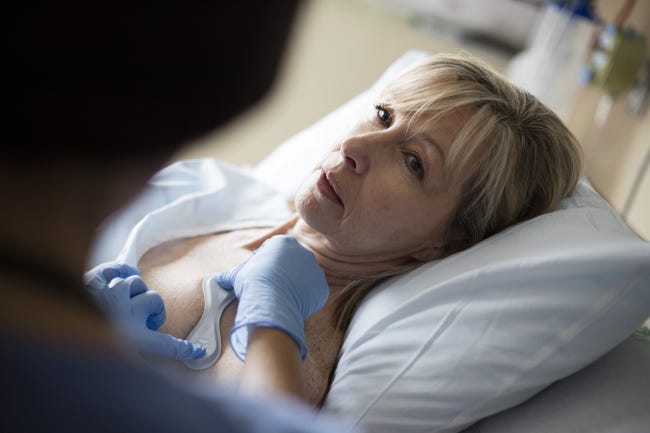Philips Debuts Wireless Patch to Monitor Vitals
February 23, 2016
The new technology seamlessly connects a wearable biosensor that can monitor patients' vital signs wirelessly, and transmit the data to remotely to a caregiver or clinician.
Kristopher Sturgis

Royal Philips has launched a medical-grade biosensor that automatically and continuously measures clinically vital signs including heart and respiratory rates, skin temperature, respiratory rate intervals, and body posture. It can even detect falls while the patient is in their room. The biosensor then transmits the data to a clinical decision support software application that can be configured to alert caregivers and clinicians when preset vital sign limitations are exceeded.
"This addresses a very important need, due to a growing aging population and a rising number of people with chronic diseases," says Ravi Kuppuraj, who is the chief architect for patient care and monitoring solutions at Philips.
"Healthcare stakeholders are seeking more cost-effective ways to monitor, diagnose, and treat patients. To address these challenges, health systems are actively adopting new connected health technology solutions like apps and wearables that are designed to help reduce costs and improve patient outcomes -- all while reducing complications and adverse events, hospital-acquired infections, length of stay, and readmissions."
The technology represents the latest in clinical wearables designed to not only improve patient care, but improve comfort and efficiency when using the device to monitor crucial patient data.
"For the patients, the biosensor is designed to promote patient comfort and is self-adhesive, and worn discreetly on the chest," Kuppuraj says. "We also believe that these wearable biosensors will help speed recovery -- patients will be continuously monitored and the biosensor will help promote mobility and movement. Movement not only helps patients avoid problems like sepsis or infection, but it also helps patients become more involved in their own care."
Kuppuraj believes this wireless capability will better allow clinicians to have increased access to vital signs and patient information unlike ever before. He says that the partnering software can be easily configured, alerting healthcare personnel whenever certain parameters are exceeded. With a quicker response time, clinicians will hopefully be able to intervene quickly when a patient's condition begins to deteriorate. However, Philips is quick to distinguish their technology from other generic fitness trackers with similar capabilities.
"It's important to understand that all wearables are not created equal," Kuppuraj says. "Unlike the fitness trackers on the market today, this new wearable biosensor represents a complete solution as it measures clinically relevant vital signs and connects to clinical tools. When connected to connected software, it transmits information that is then analyzed by the solution and turned into potential actionable clinical insights that could affect patient outcomes."
For now, Kuppuraj says that there is still a lot of remaining potential in the technology that Philips hopes to move forward with as the company looks to enhance the device. The biosensor technology was designed to connect to the Philips HealthSuite Digital Platform (HSDP) -- an open-source, cloud-based platform that already supports over eight million devices. The HSDP was designed to support the secure collection of health-related data and allow for the analysis and integration of such information with existing electronic medical records.
Kuppuraj says that the company is hopeful this technology can continue to fuel collaboration between consumers, patients, and caregivers in the broadest sense -- all while improving patient care through the use of innovative ideas and technology.
"This development builds on a long legacy of innovation by Philips," Kuppuraj said. "We have 100 years of experience in creating meaningful healthcare solutions. We look beyond technology to the experience of the people at the heart of care to unlock insights across the patient journey. Philips has been a leader in developing clinical wearable solutions for years."
Learn more about cutting-edge medical devices at BIOMEDevice Boston, April 13-14, 2016. |
Like what you're reading? Subscribe to our daily e-newsletter.
About the Author(s)
You May Also Like

.png?width=300&auto=webp&quality=80&disable=upscale)
